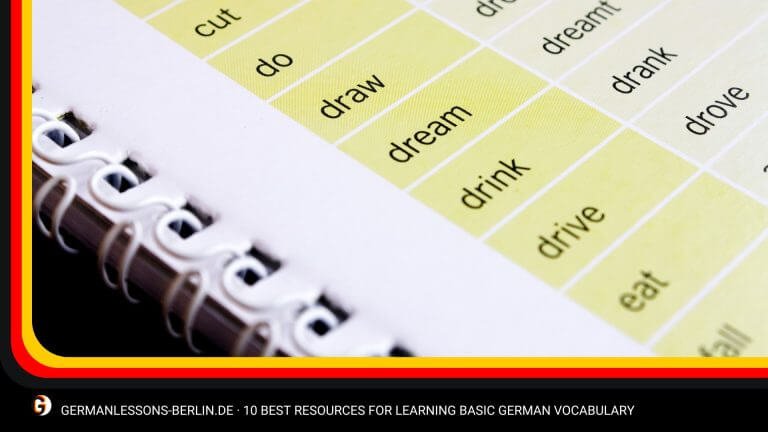Are you a beginner looking to learn German? If so, you’ve come to the right place! In this comprehensive guide, we’ll provide an in-depth look into learning German for beginners. We’ll cover everything from German grammar and pronunciation to commonly used phrases and expressions. With our help, you’ll be saying “Guten Tag!” in no time.
Learning a language can seem intimidating at first. But don’t worry – with our step-by-step approach, you won’t feel overwhelmed by the process. We know it can be challenging to start from scratch, but with our guidance and a little bit of effort on your part, you’ll be able to quickly understand and speak German fluently.
So if you’re ready to take your first steps towards mastering the German language, let’s get started!
Overview Of The German Language
German is a West Germanic language, closely related to English and Dutch. It is an official language of Germany, Austria, Switzerland and Liechtenstein, and it is widely spoken in other European countries, including Luxembourg and parts of Belgium. Like English, German has pronouns that are used to refer to people or things in the third person. These pronouns can be contracted with the verb ‘to be’, as well as other verbs.
German also has a system of conjugation for verbs according to tense, number, gender and person. This means that the form of the verb changes depending on who or what its subject is. For example, the verb ‘to be’ changes from ‘bin’ for I am to ‘ist’ for he/she/it is. Knowing how to use these conjugated forms correctly is essential for speaking German fluently.
Finally, there are several basic sentence structures that are used frequently in German sentences. These include subject-verb-object (SVO) structures like Ich esse einen Apfel (I am eating an apple), as well as subject-object-verb (SOV) structures such as Der Junge den Ball wirft (The boy throws the ball). Understanding these sentence structures will help you understand how German words interact with each other in order to form complete sentences.
Alphabet And Pronunciation
Now that you have a general understanding of the German language, it is time to dive deeper into the basics. The alphabet and pronunciation are essential components of any language. It is important to learn these first in order to effectively communicate in German.
The German alphabet consists of 26 letters, which are the same as in English: A, B, C, D, E, F, G, H, I, J, K, L , M, N ,O , P , Q , R , S , T , U , V , W , X and Y Z. However there are some extra letters such as ä (‘ae’), ö (‘oe’) and ü (‘uee’). These represent different sounds that don’t exist in English. For example “ä” is pronounced like “ay” or the “a” sound in “cat”.
It is also important to understand the proper pronunciation of words in German. Unlike English which has unstressed syllables that can be pronounced quickly or even skipped over entirely when speaking quickly or casually; all syllables in German should be given equal emphasis when spoken aloud. This is especially true for vowels which should each be pronounced clearly and distinctly. For example the word ‘Haus’ should be pronounced like ‘How-ss’.
Knowing how to properly pronounce words will help you communicate more effectively with native speakers and understand what they say more easily. Take the time to practice pronouncing words out loud until you feel comfortable doing so without hesitation or difficulty. With patience and dedication you will soon find yourself fluent!
Basic Grammar Rules
In German, the grammatical structure is quite different from English. The basic rules of grammar are essential to understand in order to communicate effectively in German.
First, pronouns are used differently than they are in English. The subject pronouns (I, you, he/she/it) all take the same form regardless of whether they are singular or plural: ich, du, er/sie/es. When using object pronouns (me, you, him/her/it), the object pronoun changes based on whether it is singular or plural: mich, dich, ihn/sie/es.
Also unlike English, German contractions can be formed when verbs and nouns combine with prepositions. These contractions often change depending on whether the noun is masculine, feminine or neuter; for example “in dem” combines with masculine nouns while “in der” combines with feminine nouns and “in des” combines with neuter nouns. In these cases it is important to remember that articles must also be included when forming contractions.
German word order also differs from English. Generally speaking a sentence will begin with the subject followed by the verb and then any other elements such as objects and adverbs will appear at the end of the sentence. This may take some practice to get used to but once mastered it will help make writing and speaking in German much easier!
Vocabulary Building And Practice Exercises
Now that you have a grasp on the basic grammar rules, it’s time to start building up your German vocabulary. This is one of the most important steps in learning any language and with German, it’s no different. To help get you started, there are some great tools available to make the process easier and more efficient.
One of the best ways to learn new words is to use online flashcards. Flashcards are an easy way to review and memorize new words quickly and efficiently. There are lots of free resources available online, so you can easily find a set that suits your needs. Additionally, if you prefer physical flashcards, there are plenty of sets available for purchase as well.
Another great tool for learning new words is audio recordings. Listening to audio recordings of native speakers can help speed up your progress by reinforcing pronunciation skills and giving you a better understanding of how words fit together in context. You can find audios online or buy CDs from language-learning stores or websites.
Lastly, you should also practice writing out sentences with the new words and phrases you’re learning. This will help to cement them into your memory and give you a better understanding of how they fit into sentences in real-life scenarios. You can look for example sentences online or create ones of your own using the vocabulary that you’re studying. With regular practice, these exercises will make sure that you’re able to recall what you’ve learned even after weeks or months away from it!
Popular German Expressions And Slang
Popular German expressions and slang are an important part of understanding the language. While many of these phrases are informal, they can be used to communicate in everyday situations. Knowing some of these popular expressions can help you sound more natural when speaking German.
Many of the most popular German expressions involve idioms, which are phrases that mean something different than what they literally say. For example, ‘Es ist mir Wurscht’ is an expression that means ‘I don’t care’ or ‘It doesn’t matter to me.’ Similarly, ‘Das ist mir egal’ translates to ‘It doesn’t matter to me.’ These expressions can be used when you don’t have a strong opinion about something or don’t want to get involved in a discussion.
You’ll also hear Germans use lots of unique slang words and phrases when talking informally with each other. Some popular examples include ‘Fettsack’ (meaning ‘lazy person’), ‘Saufen’ (meaning ‘to drink alcohol’), and ‘Bammel haben’ (meaning ‘to be afraid’). These words should be used carefully as they can be seen as offensive if used in the wrong context.
Overall, familiarizing yourself with popular German expressions and slang is a great way to improve your conversation skills and make sure you understand what people around you are saying!
Resources For Self-Study
If you’re serious about learning German, there are a variety of resources available to help you. There are books, websites, apps and even online courses that can help you with your language skills. Here we’ll look at some of the best resources for self-study.
Books are still a popular choice when it comes to learning a language. A good German textbook will give you an overview of the language, as well as teaching grammar, pronunciation and vocabulary. Look for books that come with audio recordings so you can listen and practice your pronunciation.
Websites and apps can also be useful tools for learning German. Many websites offer free lessons on grammar, vocabulary and pronunciation. Apps such as Duolingo provide interactive lessons which make learning fun and engaging. You can also find plenty of online courses which offer comprehensive instruction in languages like German.
No matter what resources you use, the key to success is consistent practice. Set aside some time every day to study and practice speaking German, and soon enough you’ll see results! With the right approach and dedication to your studies, you’ll be able to master the basics of German in no time at all.
Cultural Contexts Of The Language
Fully understanding the German language involves more than just memorizing words and grammar rules. It also involves becoming familiar with the cultural context in which the language is used. To help learners better appreciate the nuances of the language, it’s important to explore German culture and its influence on language.
One way to do this is by exploring different aspects of German life and history. For example, one can look at how Germany has changed over time or explore how German literature has impacted contemporary culture. Additionally, it’s important to become familiar with regional dialects and different forms of communication that are common in Germany.
Learning about the culture behind a language can also help provide insight into why certain phrases or expressions are used in certain ways. This can be especially useful for mastering slang and colloquialisms, as well as understanding when to use more formal or informal speech. Researching a variety of topics related to German culture can help learners gain an appreciation for all aspects of the language and ensure they have a deep understanding of its usage.
Immersing Yourself In The Language
A great way to become fluent in German is to immerse yourself in the language. This means listening to native speakers, conversing with them, and reading German texts. You can find many different ways to do this, depending on your location and resources.
If you are lucky enough to live in an area with a large German speaking population, you should take advantage of it! Talk to people and practice your conversation skills. Listen carefully when they speak and try to pick up new words or phrases. You may also be able to attend events, such as plays or lectures, that are spoken in German.
Another option is watching TV shows and movies in German, with subtitles if necessary. This will help you get used to the sound of the language, as well as its rhythms and intonations. Listening to music is also beneficial; try singing along and see how far you can get! Reading books or magazines is another effective way of learning; even if you don’t understand every word, understanding the context can help you figure out what’s going on.
No matter how you choose to immerse yourself in German, make sure it’s something enjoyable for you – otherwise it won’t be much fun! Get creative and have fun while learning the language – that’s the best way!
German Dialects And Variations
Now that you’ve begun to immerse yourself in the German language, it’s time to look at the different dialects and variations of the language. German is spoken by more than 100 million native speakers across Europe, so there are many dialects and variations of the language. Each region has its own unique accent, words, and grammatical structures.
In Germany, there are three main dialects: High German (Hochdeutsch), Low German (Plattdeutsch), and Middle German (Mittelhochdeutsch). High German is the standard form of written and spoken German in Germany. Low German is spoken mainly in northern Germany, while Middle German is used mainly in central and eastern Germany.
Outside of Germany, there are several other dialects that are based on local languages or varieties. Examples include Swiss-German, which is a blend of Alemannic and High German; Austrian-German; Luxembourgish; Yiddish; Pennsylvania Dutch; and many more. All these dialects have their own distinct features, such as pronunciation, vocabulary, grammar rules, and even cultural influences.
It’s important to note that although these dialects may differ significantly from one another, they are all still mutually intelligible – if you know one dialect well enough then you should be able to understand other varieties as well. Learning multiple dialects can also help deepen your understanding of the culture associated with each region. Understanding regional variations can help you become a more confident speaker of the language overall.
Tips For Learning German Quickly
Learning German quickly requires dedication and hard work. However, there are some tips that can help to make the process easier. First, it is important to have a clear understanding of the grammar rules. This means studying verb conjugations, sentence structure, and other topics related to language structure. Additionally, having a good vocabulary is essential for speaking German fluently. Memorizing words and phrases will help you become more comfortable using them in conversation.
Practicing with native speakers is also key to mastering the language quickly. There are many online resources available where you can find native speakers from Germany or other countries who speak German as their first language. You can also find local language exchange partners or join a group that meets regularly to practice conversing in German. This will give you an opportunity to get feedback on your pronunciation and receive helpful corrections from someone who is familiar with the language.
Finally, read materials written in German as often as possible. It doesn’t matter if they are books, magazines, or even blogs – all of these sources can provide valuable insight into how native speakers use the language and help you better understand the nuances of the language. Additionally, reading material written in German can help improve your overall comprehension of the language and boost your confidence when speaking or writing in it.
Frequently Asked Questions
What Are The Best Online Resources For Learning German?
Learning a new language can be an intimidating experience, especially when it comes to German. With its unique grammar and pronunciation rules, it’s no wonder why many people struggle when trying to learn the language. Fortunately, there are a plethora of online resources that can help anyone looking to learn German. In this article, we’ll discuss what some of the best online resources are for learning German.
When searching for the right online resource for German, the first thing you should look for is content specifically designed for beginners. Most websites have an array of beginner-friendly material that will get you started on your learning journey. For example, there are numerous free videos available that teach basic words and phrases in German as well as audio lessons which focus on pronunciation and speaking skills. Additionally, some websites offer interactive activities such as quizzes and games that will help you practice your newly-learned vocabulary and grammar.
For those who want more comprehensive learning materials, there are plenty of paid courses available from both individual tutors and larger companies. These courses usually cost money but they often provide users with access to a greater range of content such as structured lessons, live sessions with native speakers, or even virtual tours of Germany’s major cities like Berlin or Munich. This type of coursework is great for those who want to dive deeper into the language and culture of Germany without having to make an in-person trip overseas.
No matter where you decide to find your resources for learning German, it is important to remain consistent in your studies so that you can continue to build upon your knowledge base over time. Regularly revisiting concepts and vocabulary words is key if you want to improve quickly and effectively while having fun along the way!
Are There Any Helpful Tools For Improving My German Pronunciation?
Learning a new language can be quite a challenge, and German is no exception. One of the most difficult parts is mastering the pronunciation. Thankfully, there are some helpful tools that can make this process much easier. Are there any helpful tools for improving my German pronunciation?
When it comes to learning German pronunciation, one of the most important things to remember is the mouth positions and sounds that are used in the language. There are various online websites and apps available that can help with this. For example, some offer audio samples of native speakers saying certain words and phrases that you can practice. Others provide visual diagrams showing how each letter should be pronounced. These tools make it much simpler to learn the nuances of German pronunciation.
One great way to practice your German pronunciation is by using a voice recognition app or program. These use speech recognition technology to give you feedback on how accurately you’re pronouncing words or phrases in real-time. You can also record yourself speaking to compare your efforts with those of native speakers. This type of tool helps you quickly identify which areas need more work and allows you to adjust your accent accordingly.
With all these resources available, tackling the often-tricky task of mastering German pronunciation doesn’t have to be so daunting after all! With a bit of practice and dedication, you’ll soon be confidently speaking like a native speaker in no time at all!
Is It Easy To Find German Language Partners To Practice With?
Finding German language partners to practice with can be a great way to improve your language skills. Whether you’re just starting out or have been studying for some time, speaking with native speakers is one of the most effective ways to learn a language. Fortunately, there are many options available for locating German language partners and engaging in conversations.
For those looking to practice their conversational German, online forums and social media sites offer an easy way to find language partners. By joining communities dedicated to learning German, you can connect with other learners who share the same goals and interests as you. Additionally, many online platforms provide random matchmaking services so you can quickly find someone willing to converse in German. That said, it’s important to remember that these conversations should be kept civil and appropriate at all times.
Finally, if you’d prefer a more structured approach, there are also plenty of professional services that specialize in helping students find language partners. These range from formal tutoring programs to casual meet-up groups where participants can practice their conversation skills in person. Regardless of which option you choose, it’s always beneficial to make sure your language partner is knowledgeable about the subject matter so that you get the most out of each session.
By taking advantage of these tools and resources, anyone interested in learning German will be able to easily find someone willing to help them hone their conversational skills.
Are There Any Books Or Films In German That I Could Use To Learn The Language?
When it comes to learning a new language, there are many different resources available to help. One of the best ways to improve your speaking and comprehension skills is through practicing with native speakers or using books and films in the target language. With this in mind, one might ask: are there any books or films in German that I could use to learn the language?
The answer is yes! There are a variety of books and films from which to choose when trying to learn German. For beginners, classic novels such as Goethe’s Faust or Grimm’s Fairy Tales can be great sources of language practice; they use less complex vocabulary and provide insight into the culture. There are also more modern works such as The Neverending Story or Goodbye Lenin!, which give readers a chance to experience contemporary German literature at their own level. Films are also an excellent way to immerse oneself in the language; classics like Run Lola Run, Das Boot, and Good Bye Lenin! offer a great starting point for learners looking for an entertaining way of getting familiar with the pronunciation and grammar of spoken German.
For those who prefer more structured resources, there are plenty of textbooks available for all levels of German proficiency. From absolute beginner courses like Teach Yourself German to university-level textbooks on advanced topics like linguistics, readers can find something that fits their individual needs. Additionally, there are online websites such as Duolingo or Memrise that offer interactive tutorials and exercises designed specifically for learning German.
No matter how you choose to approach it, there is no shortage of materials out there for those wishing to learn German. Whether you decide on novels, films or other educational materials, you’re sure to find something that will help you get comfortable with the language in no time!
Are There Any Good Apps For Learning German On The Go?
Learning a language can be a daunting task, but there are plenty of tools to help you on your journey. One of the most useful is an app for learning German on the go. With these apps, you can practice and improve your German skills wherever you are.
Whether you’re at home or out and about, having an app to learn German on the go can be invaluable. Many of these apps offer interactive features that make it easier to learn the language quickly and effectively. You can listen to audio recordings, practice pronunciation, and even have conversations with native speakers. Plus, they often come with quizzes and other games to keep you motivated and engaged as you progress through your lessons.
With so many great options available, it’s easy to find something that fits your needs and schedule perfectly. Whether it’s a comprehensive course or just some basic vocabulary words, there’s an app out there that will help you learn German faster than ever before. So don’t wait any longer – get downloading today!
Conclusion
I’m glad I decided to learn German. With the right resources, it’s not too difficult to make progress. As I’ve explored some of the best online resources for learning German, helpful tools for improving my pronunciation, ways to find language partners, books and films in German, and apps to study on the go, I can confidently say that I’m well prepared to take on this new challenge.
I have a feeling that if I practice diligently and use all of these great resources at my disposal, I’ll be able to master German in no time. It might take a bit of hard work but with enough dedication, I know I can do it! After all, it’s incredible what you can achieve when you put your mind to something.
All in all, learning German is an exciting journey and one that will open many doors for me in the future. So let’s get started – here’s to becoming fluent in German!




